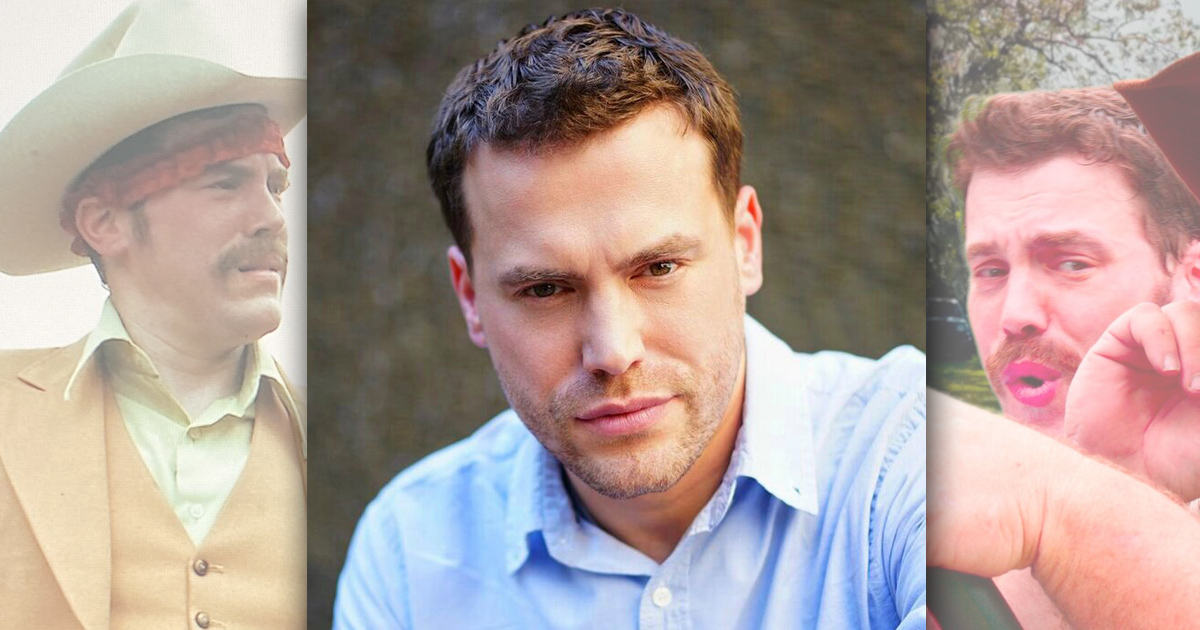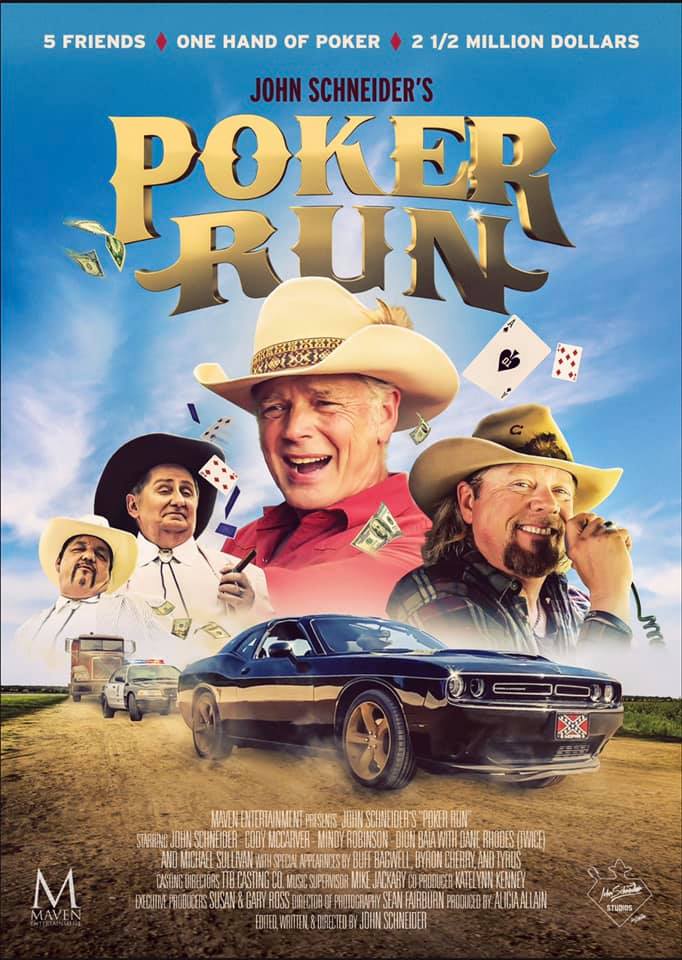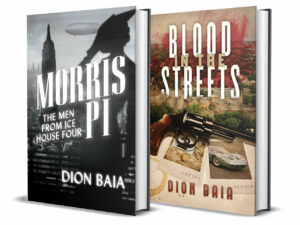
Dion Baia is an actor, author, podcaster and behind the scenes talent (as well an occasional on-screen personality) on a variety of Fox News programs. He is currently reprising is role of Sonny T. Necessary from the Smokey & the Bandit– influenced Stand On It in John Schneider’s new film, Poker Run.
Your experience prior to your roles in “Stand On It” and “Poker Run” were in short films, as well as behind and a bit in front of the camera on Fox News. How did you end up getting involved in these projects?
I went to film school and have always been interested in acting and directing. I started out at Fox in 2002 behind the camera as an in-studio audio guy, but also tried to act on the side whenever I was able. In the meantime I wrote my first two books as screenplays with the hopes of breaking into the film industry that way, ultimately writing four. The day job was at Fox but I’ve always tried to keep focused on movies, and did stuff here or there in my spare time when the opportunity arose. At Fox, Neil Cavuto was a huge supporter 0f mine and because he and I share the same sense of humor, he started putting me in front of the camera in 2011 on his Fox News show to be the punchline of his then motto, “If you don’t get Fox Business (call your local cable company) …” to which I would answer, “Demand it!” And that became a huge thing with his show and Fox fans. We started doing it on an almost daily basis- which basically was me, doing stand-up or a short skit on a business show- on a news channel, with the whole idea being that Neil would never know what I was going to do next, so it was me trying every day to do something so outlandish or silly just to make him burst out laughing, which meant the audience then was laughing. Long before the Gutfeld! show utilized SNL-type skits which are now immensely popular on FNC, we were doing that on Your World with Neil Cavuto in the most unlikely place because of Neil, and I became the Demand It! guy. I ‘played’ James Mason, Sean Connery, Columbo, Bing Crosby at Christmas, and even lampooned Imus when he and Neil were in a pseudo-Jack Benny vs Fred Allen type feud- just to name a few. That morphed in 2014 into a Friday panel segment called Gen Hexed, where we were joined by a rotation of millennials as we covered light-hearted and sometimes funny bits of news that varied week to week, discussing topics from a young person’s perspective, more specifically what their reactions were to things- full disclosure though, I’m a Gen-Hexer with the soul of a very old man.
 Both films pay homage to the “Smokey and the Bandit” films. I know you took a deep dive into the original Smokey and the Bandit on your Saturday Night Movie Sleepovers podcast. What your experiences with the films when you were younger?
Both films pay homage to the “Smokey and the Bandit” films. I know you took a deep dive into the original Smokey and the Bandit on your Saturday Night Movie Sleepovers podcast. What your experiences with the films when you were younger?
They were institutions in my household growing up. Smokey and the Bandit 3 was running continuously on the premium channels when I was very young because it was new, which meant they also had both the original and Smokey and the Bandit 2 in heavy rotation. So, by the time I was ten I knew the original Smokey and the Bandit by heart. Those three and other cult classic like The Big Lebowski, Kelly’s Heroes or Clue in many situations ended up helping bond me with future life-long friends, due to our mutual obsession with said movies- reciting the most obscure lines or references to see if the other would get it. That is actually how I originally bonded with Tyrus, due to us BS’ing in the greenroom with me throwing a random Jackie Gleason line out and him responding back with whatever the next line was or something just as funny from the film.
What can you say about your character Sonny T. Necessary?
I certainly didn’t want to touch Mike Henry’s iconic performance as “Junior” in the original trilogy, and I also wanted to attempt to update the role so I wasn’t doing the same thing he did, which may not translate these days as well as it did forty-five years ago. Sonny isn’t the brightest bulb in the room, but he tries. Probably worst of all is that Sonny doesn’t know this, and thinks he is more-smarter than he really is. I hear that some complaints of the younger generation are that even though they are absolutely tech savvy, they don’t always know their history, geography, or what have you- so I tried to play him as through he thinks he’s a brainiac, but he’s not that much more intelligent than a fourth grader. But his Shakespearean flaw is he’ll never know how dumb he is or how he comes off to others. It’s tragic, actually.
The films both look like they were a blast to film. What can you tell us about your experience shooting?
Shooting the films was an absolute blast. We all bonded as a cast right off the bat, and since Tyrus and I were already friends, it was quite easy for us to ad-lib and just run with it, which actually became some of our funniest gags. When you end up having a chemistry with your costars, it really ends up translating onto the screen. And I did the majority of my own stunts in both films, I even fractured my collarbone while doing a stunt at the end of the ‘stand on it’, which was just due to the weather, and luckily it was one of the last things I needed to shoot. But it all came off great in the finished product.
I know John Schneider likes to shoot economically and efficiently. Given the limited production costs, I would think it was a real team effort to get done. What can you tell us about the production?
The production reminded me of my old film school days, where we all helped out to get whatever was needed in order to get the shot or scene done. That then led to the real comradery that you get on smaller productions, where you all become a family and it becomes an all-hands-on deck kind of shoot to get the film done. And because of how close the cast and crew got, I think that helped put the idea in John Schneider’s head to make another, and perhaps go forward from there.
I’d like to ask your about your books, “Blood in the Streets” and “Morris PI: The Men from Ice House Four.” They’re both period detective stories, though from two completely different eras. Can you talk about your inspiration for writing both?
They were both originally written as screenplays which I still intend on one day getting made. The first one, Blood in the Streets was a love letter to the 70s cop movie and genre as a whole, with an attempt by me to bring the action and thriller genre back to its early roots, and to be able to explore what it takes for a character like Steve McQueen’s Lieutenant Frank Bullitt to become the jaded and cynical Inspector Harry Callahan that Clint Eastwood portrayed in his Dirty Harry series. And giving the story a factual backdrop for the story to exist in helped convey the realism involved. My second novel, Morris P.I., came from my love of the hard-boiled detective genre and films like Indiana Jones, Dick Tracy, Tim Burton’s Batman, and The Rocketeer. But again, since we were dealing with an historical context of New York City at the end of World War II, it was imperative that nothing was lampooned or satirized. In this day and age, you just can’t have Nazis be the bumbling fools they are portrayed as in a Hogan’s Heroes say- these were real, evil and terrible people who were actual monsters. So it that respect, the book and script is closer to an Chinatown, L.A. Confidential or The Boys From Brazil. The main goal was for as fantastic as the plot would get, one foot needed to be firmly grounded in reality to help keep the story plausible and hopefully, exciting.
How much research did you do into the time periods?
I did tons– years of research for both stories. For Blood, I wanted to make sure the era and political tension that was in the air at the time was correct, as was the urban renewal background which played heavily in New Haven history (where the story is based) was accurate. It was crucial to make sure those aspects were right, as well as even making sure certain aspects of the rock group The Doors (whose song Peace Frog has the line that gave the story its title) was accurate; as well as the certain points in Jim Morrison’s career highlighted within the story were completely correct, so fans of their music could actually identify what specific tours or even what events were occurring during the scenes he appears in. Even making sure the police jargon, equipment and even cars was completely correct for 1976. This was even more so a concern with Morris P.I. as the main villain of the plot (spoiler alert!) we find out is Josef Mengele and everything he utters out of his mouth is factually correct, as well as all the background concerning the Nazis and their horrific atrocities at the concentration camps was absolutely precise; which was also the same with the child serial killer and cannibal Albert Fish. His horrible story is interwoven with the story’s narrative, and for me, when you can take a piece of fiction and set it in a real event or within a certain time period, and have it touch nonfictional aspects, I always find those stories the most rewarding and clever when I read or watch them. I even included an appendix in Morris to highlight all the nonfictional aspects, so the audience would know when the fiction would stop and real life would actually begin. Researching such horrible content for Morris P.I., and the amount of reading that had to be done specifically on such terrible topics, really put me in a bad place for a little while- to truly read and absorb the sheer brutality man is able to inflict on his fellow man or animal is at this point for me, always surprising. And these two lead characters, New Haven Homicide Detective Frank Suchy and Harlem Private Detective Walter Morris were written with the idea of each being a trilogy- the second and third of which is already mapped out for Morris, while only the second Blood, a prequel is currently outlined.
What is your writing process like? Do you set time aside each day? Do you outline the story or do you just write as you go?
Traditionally I’ve been a night owl. I like to say I keep a jazz musician’s hours, so I used to always write at night when I got home from work. But when I’m in the ‘zone’ and trying to get as much as I can onto the page, I tend to have my laptop with me at all times, so when I am commuting to and from work, or while I have free time, I can quickly take it out and continue working. The older I get, the more I write during the day and in the morning- and I tend to immerse myself in whatever genre I am writing or researching, reading books and watching as many films and shows as I can on the subject. And I purposefully don’t play video games or watch sports as I figure that could be time I could be writing. The goal has always been to try to have these scripts and books be stepping stones to getting these into movies, or now even a streaming series’- I always thought to myself, if I had time to mess around and watch sports or play games, then I could be writing. I’m not crazy- I will decompress with a TV show or movie, but when I’m trying to get a story down on paper, I try with every free minute to put it towards completing my goal, which was breaking into the film industry. I usually will outline a story as much as I can to have a template to follow when I write. I am not against going at it blind, but with the stories I’ve written being historical fictions, I have to do extra prep to make sure everything is historically accurate and that my story can be seamlessly injected into a nonfictional situation. And I always have something with me to jot notes on. Usually that’s been a journal or notepad, but recently I’ve cluttered up my cellphone’s note section as I spew out ideas before they’re forgotten forever.
Do you plan on writing anymore books?
I do actually. Even though my first two were translations of original screenplays, I’ve outlined the story and scene beats for a second Blood in the Streets, which will most likely be my next project, and then after that, a second Morris P.I. Let’s just hope people will want to read them!
What does the future hold for your acting career?
Hopefully these movies I’ve been extremely lucky enough to do with John Schneider will help me land more acting work- I just have to figure out how to juggle it all. My dream has always been to be in front of the camera, and it’s taken almost twenty years to make that a reality, so I hope I can sustain that, and that people will want to use or see a zany guy like me. So drop me a line, I’m available for parties!
You can follow Dion Baia on Facebook, Twitter and Instagram.
Poker Run is available for pre-order at JohnSchneiderStudios.com

